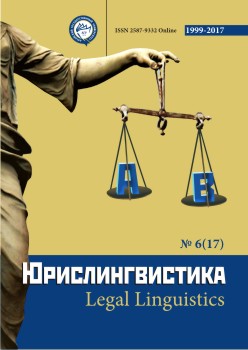REFLECTION OF LAW OFFENSES CAUSED BY SPEECH CONFLICTS IN THE LEGAL DOCUMENTS OF THE DEVELOPMENT OF A UNIFIED MUSCOVITE STATE
Abstract
The conceptual and terminological apparatus of the Russian law in the field of law offenses connected with verbal conflicts has passed through numerous stages of formation. The article analyses the legal system of Muscovite State from the beginning of its unification to the epoch of Peter the Great I (XV–XVII сenturies).
During the period of the Grand Duchy of Muscovy there formed and got legally enshrined the understanding of intangible rights when damage inflicted can be not only physical but also non-pecuniary or so called «disgrace».
New types of damage to the intangible rights of a person arise and get formalized, among them some types of «insults by action» cease to occupy the main place, while the offenses committed through the use of linguistic units become recognized. «Slander» ceases to be the main offense related to verbal conflicts, an important place is occupied by «insult», special attention is paid to «the sovereign’s word and deed» – offenses related to what is interpreted in modern legislation as «calls for the overthrow of the existing constitutional order». The period under discussion sees the complicated development of terminological paradigm binding crimes caused by speech conflicts. Old concepts are replaced with new ones, which yet do not have the full scope of meaning. The role of the context of an utterance becomes important and determines the legal penalty imposed.Downloads
Metrics
References
«Памятники русского права». М., 1956. Вып. 4.
«Памятники русского права». М., 1959. Вып. 5.
REFERENCES
«Heritage of Russian Law» [Pamjatniki russkogo prava]. Moscow, 1956. Issue 4.
«Heritage of Russian Law» [Pamjatniki russkogo prava]. Moscow, 1959. Issue 6.
Copyright (c) 2018 Юрислингвистика

This work is licensed under a Creative Commons Attribution 4.0 International License.
The authors, which are published in this journal, agree to the following conditions:
1. Authors retain the copyright to the work and transfer to the journal the right of the first publication along with the work, at the same time licensing it under the terms of the Creative Commons Attribution License, which allows others to distribute this work with the obligatory indication of the authorship of this work and a link to the original publication in this journal .
2. The authors retain the right to enter into separate, additional contractual agreements for the non-exclusive distribution of the version of the work published by this journal (for example, to place it in the university depository or to publish it in a book), with reference to the original publication in this journal.
3. Authors are allowed to post their work on the Internet (for example, in a university repository or on their personal website) before and during the review process of this journal, as this may lead to a productive discussion, as well as more links to this published work (See The Effect of Open Access).











